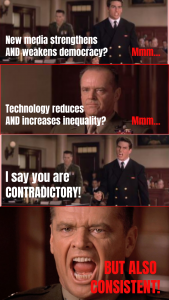We live in a complex world, where everything is about ever-changing relations and power. Writing about new media, activism and ICT in a developmental context is no different. It is a journey of complexity, duality and contradictions. My sincere greetings, however, are neither complex nor contradictory: Welcome to my first blog post, I hope you will enjoy it.
My future posts on this blog will continue to explore the complexity, duality and contradictions of:
- New media politics
With a global perspective, I will discuss the significance of new media and technology in the context of activism, development and social change. How do new media and technology affect the struggle between the state and the people and in what ways are they strengthening and simultaneously challenging democracy? - Data journalism
Because of new technologies, huge amounts of data is now easily produced and accessed by individuals, public institutions, and corporations. I will discuss how the use of these data for journalistic purposes comes with a lot of opportunities, but also countless varieties of challenges. - Connectivity for development
Increased connectivity fosters development, while it simultaneously exposes people to the colonization of data and the dependency on powerful global platform capitalists. Drawing on Abeba Birhane, that all technological tools embed and reflect our inconsistencies, limitations, biases, and political and emotional desires, I will discuss how technology, below its mythological surface of objective truths, actually confirms socially and culturally held stereotypes and injustices.
Podcast in October: Decolonizing Design Education
Since designers of new media software and technology play such a major role in the development in different societies globally, I will address contemporary design education through an interview with my partner, Tove Martens. She is a graphic designer and educator with over ten years experience of being a practitioner at her own design studio as well as an acknowledged lecturer at Linnaeus University, and currently pursues an MA in Graphic Design at Falmouth University. Please share your thoughts on decolonizing design education and post questions you want me to ask during the interview.
Finally, I just made my first meme

In an effort to symbolize the thougths and feelings of these consistent contradictions often present in social sciences, I tried to express myself through the use of a meme. It may sometimes seem like analyses that are defining contradictions and problematizing discourse are not really getting us anywhere, but I obviously believe that to be false.
Technology shapes us as we simultaneously shape technology. We cannot separate technology from society, they are constantly interconnected. And since the power structures embedded in new media and technology are still shaped by colonial legacies, there is an urgent call for decolonizing them.
Problematizing technological innovations that are actually great for many people may seem unnecessary to some people, but it is actually incredibly important. It is the foundation for pushing the discourse forward and exploring multiple perspectives. It is the goal for critical thought or as Michael Jackson writes in The Politics of Storytelling: To push back ”the horizons of what we will admit to our discourse is … essential to preserving our humanity against hierarchy.”
Ask, comment and share
If you find these subjects interesting, please share these posts with your friends. Also, check out Decolonline on Instagram and Twitter.
And please, share your own thoughts by commenting here below. Do you agree or disagree or want me to elaborate on anything? Please ask questions and tell me what you want to read more about.
Thank you for reading this first post. I hope to see you here again soon.

